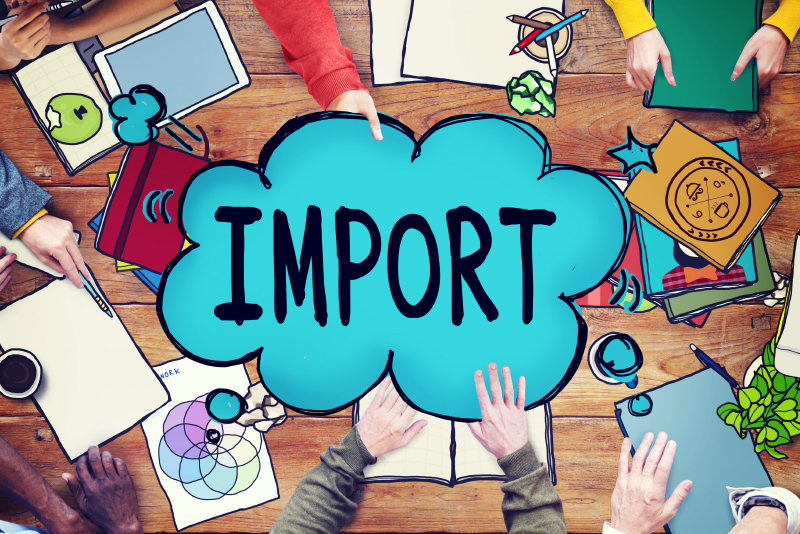There is a wealth of business opportunities for UK companies and individuals to source their products from overseas, whether from Europe or from countries outside of the European Union.
Whilst the procedure for importing from Europe as it stands is much more straightforward there are a number of import formalities that need to be considered if you wish to import from a third country like China, USA or India.
Initially, You need to do the relevant research to find the right supplier and ensure that the product is a viable option for you and your business. This may involve overseas sales visits, samples or possibly the need to organize an inspection prior to shipment to ensure that the goods are as described.
You will of course also need to ensure that the price of the goods plus any shipping charges, Duties and Import Vat payable are workable for your business.
You will need to check the Tarde Tariff to determine what level of duty is payable if any on the product. To do this you will need to establish a commodity code and look up the corresponding rates in the published tariff.
Please bear in mind that Duty is payable on the cost of the goods to arrival UK port or airport and that Import Vat is payable on all accumulative charges incurred to get the goods to the final place of delivery.
You will also need to ensure that the goods are compliant with EU law and that no specialist documentation is required or that the goods are not subject to additional controls or licensing.
Whilst a forwarder will help you and guide you through the process it is the responsibility of the importer to ensure that the goods are fit for Market.
You need to do as much research as possible to avoid delays or issues upon arrival of the cargo.
One thing that all commercial importers need to do is to obtain an EORI number from HMRC. Without this, you cannot act as an importer. It is in reality very easy and straightforward and free to apply.
Another key part of the pricing process is to establish the cost of shipping and transport, so you can add this back to your unit costs and calculate the level of profitably. The shipping charges will depend on the terms of Sale and whether you organize the shipper to coordinate the freight to arrival UK or whether you coordinate from the UK vis the use of your own shipping agent.
Again, it is advised that you familiarize yourself with these terms to ensure you know the role in terms of both responsibility and charges.
Some of the most common terms are EXW, FOB and CIF.
You will need to decide based on cost, size of shipment urgency etc what is the most suitable mode of transport and ascertain quotes accordingly.
AIR: More expensive but much quicker transit. Can be more cost effective for small shipments which can be sent by courier rather than standard freight.
Charges are based on volumetric weight.
SEA: Often the most suitable method for both part load and full shipments from third countries that are not suitable for road movement throughout Europe. More cost-effective but takes longer.
Charges based on container size or if part load then it is based on CBM and weight.
Road: More suitable for shipments from Europe. Cost based on pallet space, dimensions, weight.
Imports from China:
A large portion of imports are sourced from China and there are so many different suppliers there looking for Overseas Buyers. Again, you need to ensure that you find the right one and do the necessary checks and samples to ensure you are happy with the product. Typically, you will find the Chinese Supplier will offer a reduced rate to arrival UK port but ultimately charges are pushed forward and more often than not you end up paying more than if you controlled the freight via a broker or freight forwarder in the UK.
Imports from India
Another key market we are asked about a lot is shipments from India. You do tend to find with shipments from India that they are shipper controlled so mostly who you are being from will coordinate to arrival UK port or airport, In these instances, you need to check what the UK charges will be after it arrives to avoid inflated charges being levied once it arrives in the UK.
There are of course things you will need in place before you proceed to ensure that commercially the products can be successful. You will need to have the necessary infrastructure in place, including storage, Potential buyers, marketing strategies etc.
Even though at first it seems daunting it is the obvious step for UK businesses to source their products cheaper and direct from exporters rather than paying often inflated charges from another agent, wholesaler or distributor who may have gone through the import process themselves. There is also far more choice and far more opportunity for your business. The world is a truly global marketplace and there are so many options and exciting ventures for UK Businesses.
When you appoint a freight forwarder they will assist you with documentation, customs declarations, payment of relevant taxes to HMRC etc. and basically help to oversee the entire movement from a to b and brief you on what is required from you and when.
Do your necessary research and find a reliable partner who will assist you throughout the process. For new importers, you need a freight company who will give you advice and point you in the right direction to ensure the process runs as smoothly as possible.

